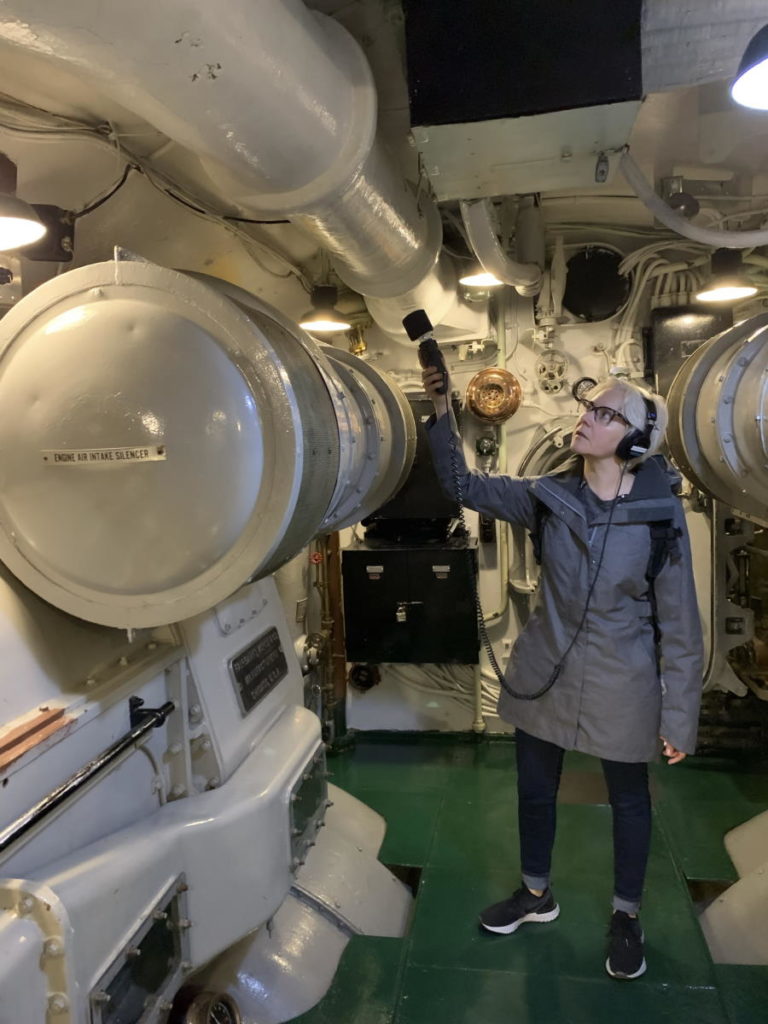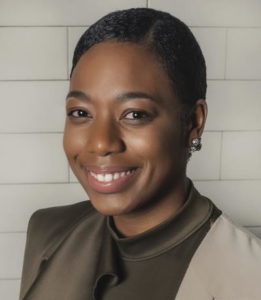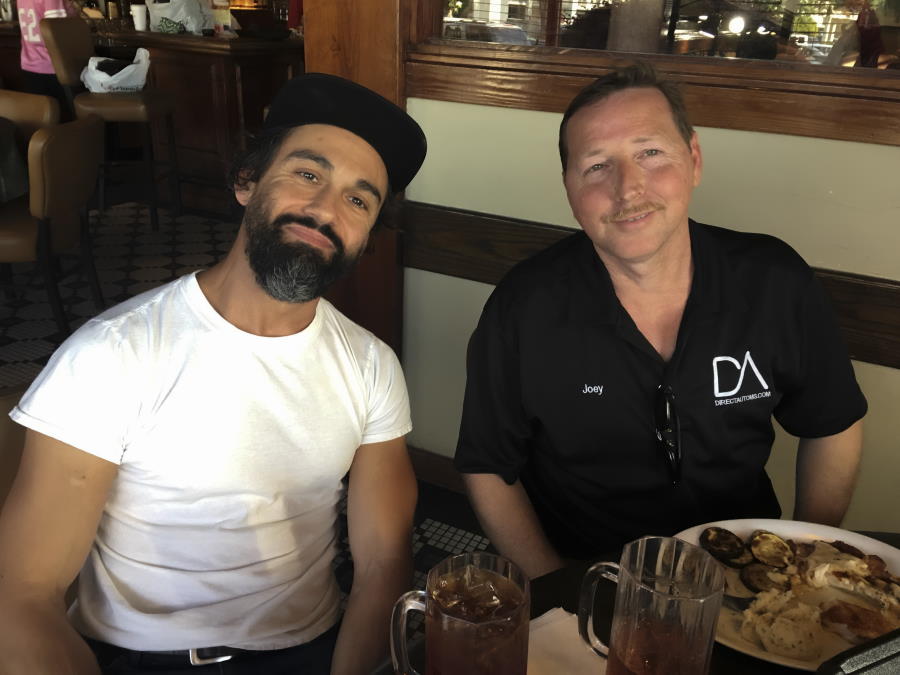This elbow of the Duwamish River in industrial south Seattle is as baffling as it is oddly beautiful. Train your eyes on the eagle in the crystal-blue sky and you almost miss the chaos below: cranes and shipping containers, mounds of garbage, old cars, stacks of lumber.
Peering through chain-link fences, talking over the twin drones of heavy machinery and low-flying airplanes, Jennifer Welch and Jon Bernson absorbed the sights and sounds of this polluted Superfund site in early April. Welch (she/her) is the founder and producing artistic director and Bernson (he/him) the artistic producer of StoryWorks, a documentary theatre company that transforms investigative journalism into theatre. They’re here to get the lay of this land as part of a collaboration with Seattle-based journalism outfit InvestigateWest’s yearlong 2021 reporting project on climate change, called Decarbonizing Cascadia. From that body of work, StoryWorks will create a new audio play, written by a soon-to-be commissioned playwright, to premiere in late 2021.
“We have high standards for fact-based storytelling, but that doesn’t mean that we’re recreating the journalism onstage,” Welch said over Zoom earlier this spring of the company’s ethos. “That’s not interesting. It’s not necessary. We’re a documentary theatre company that follows newsroom ethics, and we’re absolutely trying to find an artistic entry point into the story, so that we can tell the emotional as well as the factual truth of the reporting.”
The phrase “documentary theatre” can ring of homework, or the ghost of school assemblies past. But the tales StoryWorks tells—a total of 14, typically rendered in live performance, though occasionally in other mediums, like this audio play—are at least as dramatic as fiction, sometimes moreso. As Bernson filmed along the Duwamish, he expressed joking surprise that no one came to question them, unlike the time he was reporting in a union shipyard in Mississippi, where a guard made him relinquish his phone and show ID, then delete all his photos while the guard watched.
This team has made visits like this all over the country, in service of partnerships with top-shelf local newsrooms to create previous stage works: to North Dakota’s Bakken oil fields; to the hair salons-slash-civil rights hubs of the Mississippi Delta; to the Emerald Triangle, a slice of Northern California ruled by the secretive marijuana farming industry.
On their drive to Seattle from the Bay Area, Welch and Bernson visited Talent, Ore., which suffered massive wildfires in the fall of 2020, to survey the damage and to better understand residents’ anger that evacuation came earlier for the tonier town of Ashland, right next door. They’ll next venture up to Grand Coulee, named for the massive nearby hydroelectric plant on the Columbia River, which data revealed to be the regional community most vulnerable to climate crises.
Other destinations may be determined by the subjects or locations they notice popping up in incoming playwright proposals (open through May 9), and they’ll go wherever they need to to internalize the scale of the reporting.
“We’re trying to get to a place where we know the story and the environment in our bones,” said Bernson, who is sound designing the Decarbonizing Cascadia piece. “You really have to understand it on a sensory level.”
This is the beginning of the process: listening, learning, researching, understanding the people and places in the original reporting. Later, the selected playwright’s vision takes the material in directions the StoryWorks team could never predict. Octavio Solis’s dual-language play from 2015, Alicia’s Miracle, told a story of the impacts of agricultural fumigants used in California’s billion-dollar strawberry industry, in the tradition of El Teatro Campesino. Last year Eugenie Chan transmuted powerful reporting on sexual abuse in the marijuana-farming industry into Journey to Emeraldville. In 2016, R.N. Sandberg transformed a story of leaking underground residential fuel tanks in New Jersey into an absurdist comedy called Terra Incognita.
Walking through the Seattle damp early this spring, I was surprised to discover that I was having a genuinely theatrical experience—a rare occurrence at all in the last year, let alone through my headphones. Bernson’s 2019 StoryWorks audio drama When Lighting the Voids hits the hat trick of compelling narrative, interesting production value, and good acting—a combination I haven’t encountered often in my experience as a dedicated consumer of audio content—and offers a front-row seat to corruption in the shipbuilding industry.
Theatre may be StoryWorks’ product, but “changing the way we experience journalism” are the first words you read on the StoryWorks website. Both mediums appeal to that part of our brains desperate to make sense of the world, and the search for truth fuels both artists and journalists, whether they’re mapping reality through facts or emotions.
Theatre is in a crisis, thanks to COVID-19 (among other longstanding issues), and journalism has been in crisis for years, thanks to 24-hour news cycles, unreliable aggregators, scrolling headlines on your phone at 3 a.m. By cross-pollinating the mediums and disrupting the ways in which we habitually consume and create them, both are effectively amplified.
“Art engages with journalism to say, there are ways to do things differently, that engage with communities in a more holistic, organic way that can still convey really important facts and findings,” Welch said.

StoryWorks was born of frustration and revelation, explained Welch, who came up in the professional theatre world when it was caught in what she described as a cycle of very conventional theatremaking. In her role as producing artistic director of Tides Theatre in San Francisco, she said, “Every day I was struggling with, how do we as a company live up to our mission statement, which was: ‘To inspire, challenge, and heal our community by creating visceral theatre that is bold and truthful’?” Those lofty ambitions “felt performative,” she recalled.
In the early 2010s, Welch participated in a years-long study conducted by Theater Bay Area, market research firm WolfBrown, and the Doris Duke Foundation that asked a critical question: How do you measure the intrinsic impact of performing art on a community? What did theatres think they were giving to an audience, and what were audiences receiving? That’s where the revelation came in.
“It became clear that the experience that the audience was having was so different than [the experience] the artists thought the audience was having,” Welch said. “At the same time, there was very little attention paid to the artists’ experience.” Everyone, audience member and artist, was experiencing work individually. “So,” she asked, “where does the collective experience actually happen?”
The first StoryWorks project, in 2013—then a collaboration between Tides Theatre and the Center for Investigative Reporting, before StoryWorks became a standalone entity—was a pair of one-act plays. Headlock, by William Bivins, about a murder in an adult long-term care facility in California, was based on the “Broken Shield” series by Ryan Gabrielson for the CIR. A Guide to the Aftermath, the story of a homeless female veteran living on L.A.’s Skid Row, was written by Bernson and based on “Her War: The Invisible Crisis of Women Veterans,” by Mimi Chakarova for the podcast and radio show Reveal, produced by PRX and CIR.
“The search for truth, and a deeper understanding of our humanity—that’s what motivates artists and journalists,” said Welch, who, after that initial collaboration, went on to work for the Center for Investigative Reporting from 2015-2019, when StoryWorks became a standalone entity. That embedded, theatre-meets-newsroom collaboration became StoryWorks’ modus operandi.
There’s no formula for a StoryWorks project. Sometimes they partner with a newsroom in the early days of its reporting, as with Decarbonizing Cascadia. Sometimes they’re predominantly doing follow-up reporting to gather the information needed to create life onstage—much, much more than needed to create a written piece of a few thousand words, or a short audio news segment.
In the case of Wade Through the Waters, StoryWorks did original reporting after the company was approached by the town of Shaw, Miss., to tell the story of Andrew and Mary Lou Hawkins, their successful legal battle with the town over the unequal distribution of municipal services, and the deadly consequences of that conflict. Earlier this spring, the company was awarded the 2020 Mississippi Humanities Council Preserver of Mississippi Culture Award for that production.

Aallyah Wright (she/her), a professional journalist as well as a producer, reporter, and playwright with StoryWorks, was a co-writer of Wade Through the Waters. She emphasized that the company’s foundational principles are as much about trust as rigor and research.
“It’s not a transactional relationship,” said Wright, of her StoryWorks interview process. “We want you to learn about us and who we are and why we want to do this work. We wouldn’t be able to do this work if it weren’t so embedded in community. No matter who I’m interviewing, or about what particular topic, at the end of the day, these folks are all human beings, and I’m a human being.”
These plays are not “inspired by” or “based on” real events; they are wrought from real people’s lived experience.
Mississippi rain pounded in the background as I talked with Joey Pettey, a former employee at VT Halter Marine Inc.’s shipyard in Escatawpa, Miss., the location at the heart of When Lighting the Voids, based on Reveal reporting by Jennifer Gollan. The shipyard where cut corners—cut by a company with major government shipbuilding contracts—resulted in a 2009 explosion that killed two people and badly injured more, one dangerous incident of many.
“I caught a lot of heat on my end because, you know, when you live in a small town, this is a lot of people’s livelihood,” Pettey said. “But I told them, ‘Look, man, I’m not saying nothing that’s not true. You wasn’t there. I was the one that pulled the bodies out.’”
When his wife saw the live production of When Lighting the Voids in Biloxi, Pettey said, she joked about seeing someone portraying her husband onstage. But she also asked if that was really how the disaster happened. “I’ve never really talked to her about it,” Pettey said. “You know, I didn’t really talk to nobody about that.”
Reporting and restaging this kind of trauma are tasks best handled with care. “The people who share with us are taking a large emotional risk, and they have very little gain from the stories being told,” Bernson said. “At the end of the day, in some sense, it has to be healing for them, and the story has to be told in a way that it is honest, and somehow points a way forward, as opposed to trying to sensationalize the events that may intrinsically have a lot of dramatic power. But if it’s handled improperly it’s an abuse of trust.”
For Todd d’Amour, the actor who played Pettey in both the live and audio versions of When Lighting the Voids, the challenge was daunting. “It’s not just that I was playing somebody who is alive,” he said. “I was playing somebody who was alive, who saved lives, and who watched other people die in front of him. And some of those people were going to be watching the story live.”
Pettey’s review: “I’d give them 10 stars if I could.”

StoryWorks’ shows always consist of two acts: the play and the community engagement afterward. After the performance, they bring the lights right up and everyone comes back onstage immediately; actors usually still in their costumes, and the real-life subjects are invited to the stage.
“We’ve broken that fourth wall and we don’t want people to retreat back into themselves,” Welch said. “We want them to still be open and having that experience of the art, but at this point, we’re starting the conversation.” Every audience member and artist may have had a different experience of the work itself, but in a conversation, we’re all in it together—not a flimsy talkback built around a show’s Important Themes, but a real conversation, which can be a transformative experience.
No matter where these plays are presented, from theatres to school gyms (always within the community whose story is being told), those conversations are a jumping-off point. The work always has room to expand.
StoryWorks’ home bases are in Clarksdale, Miss., and San Francisco; they also have team members in Arizona, and will soon bring on someone based in Washington, D.C. They just formed a partnership with the U.S. Capitol Historical Society to create a curriculum to be distributed to educators across the country—work they began with their play Beautiful Agitators, based on the life and work of Vera Mae Pigee, a Civil Rights worker and beauty shop owner in Clarksdale. Though Wright is also from Clarksdale, she had never heard of Pigee.
There’s no question of “Why now?” with a StoryWorks project. These are stories that both chronicle the past and apply to the future. The historical record is written by so few, and reexamination matters.
“It was amazing, sitting there in Clarksdale for the Beautiful Agitators opening and looking out into the community and saying, ‘Man, I want all my journalism to have this type of feeling,’” Wright said. “[Journalism] that makes you feel something, that makes you want to take action and makes you want to do something with the community and the people on the ground who are doing the work.”
Gemma Wilson (she/her) is a contributing editor to American Theatre.
"stage" - Google News
May 04, 2021 at 08:51PM
https://ift.tt/2PRhBhG
StoryWorks, Reporting Live From Your Local Stage (or Headphones) - American Theatre
"stage" - Google News
https://ift.tt/2xC8vfG
https://ift.tt/2KXEObV
Bagikan Berita Ini















0 Response to "StoryWorks, Reporting Live From Your Local Stage (or Headphones) - American Theatre"
Post a Comment